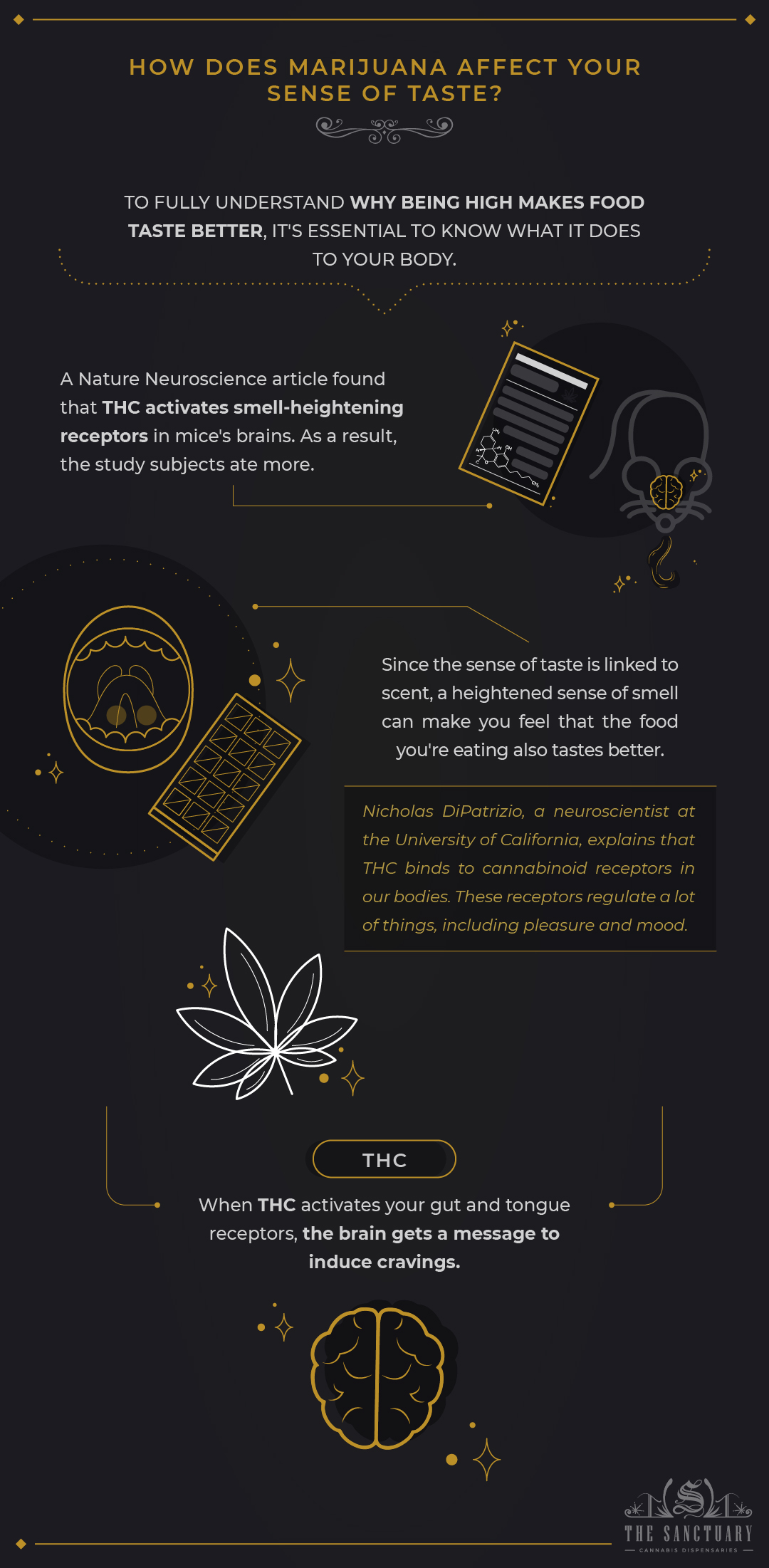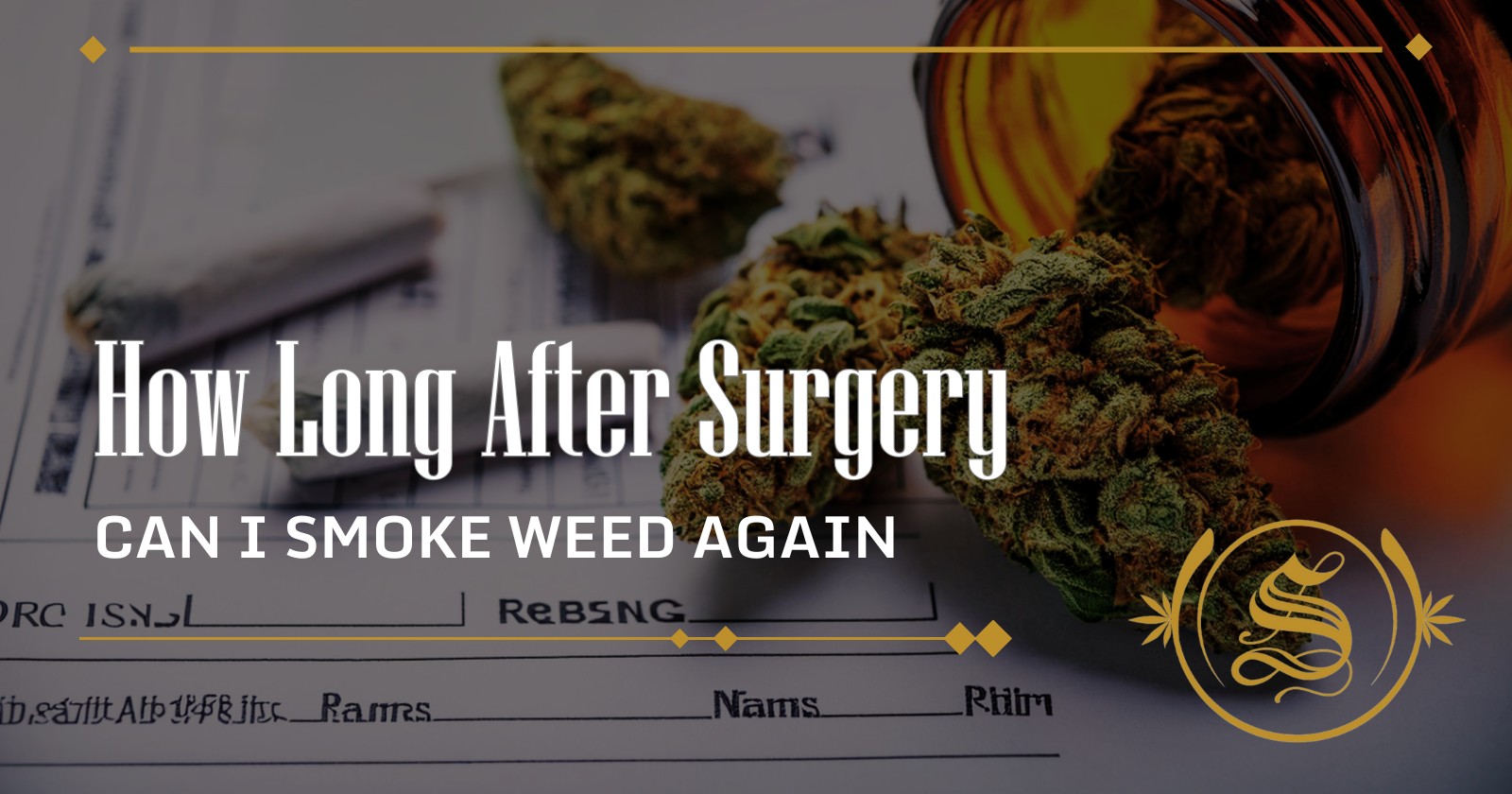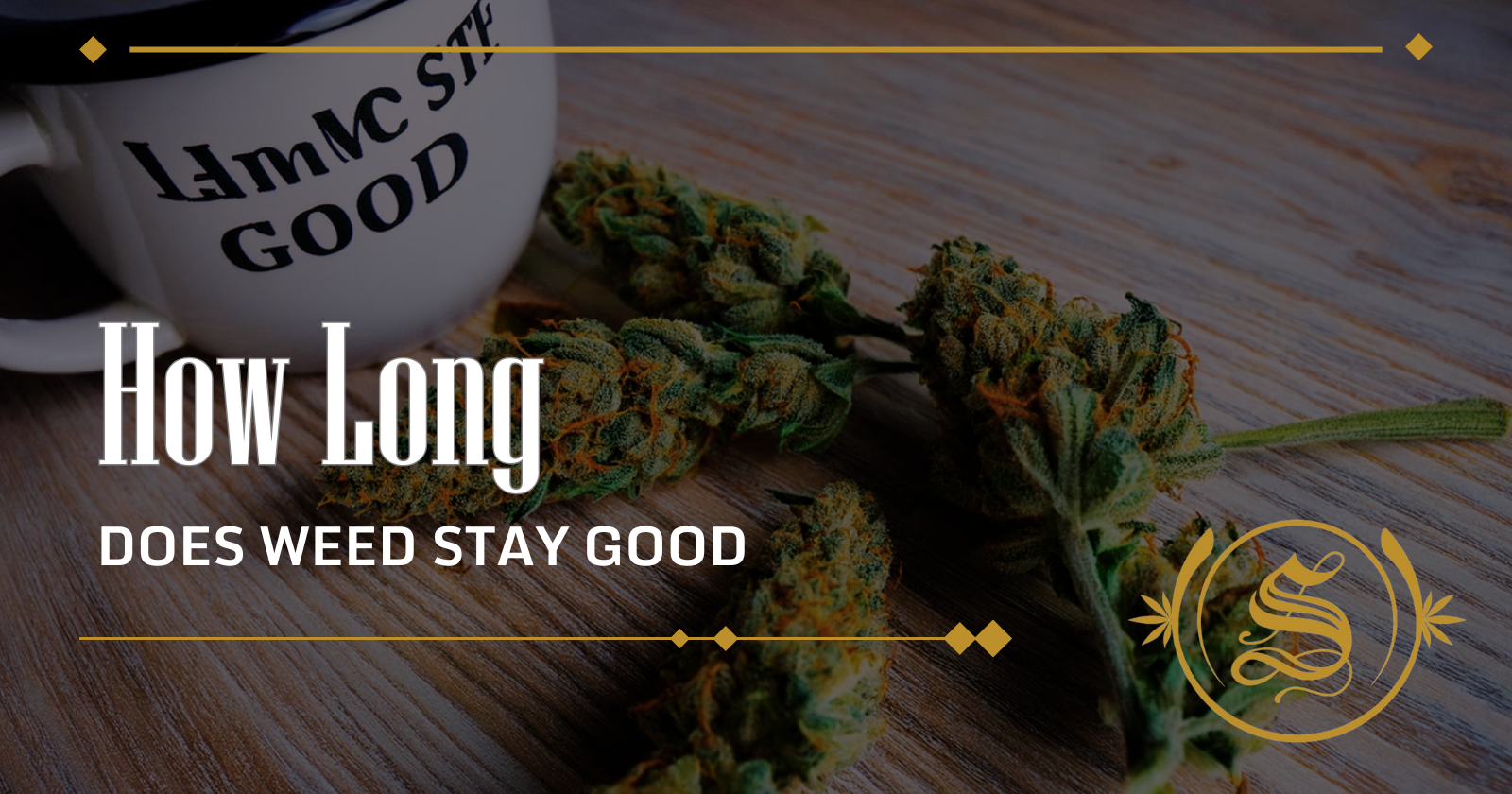Iftikhar Alam
Author
Reviewed by Cannabis Experts
Published on: June 26, 2023 | Updated on: September 11, 2024
If you’ve had weed, you’ve had the munchies. You know that feeling where you want to dig into the deepest pits of your snack cabinet to find that last Ferrero Rocher tucked behind the packs of ramen? That’s the one.
Well, it turns out that there is a scientific reason why food tastes better when you’re high. We’ll explain it in detail below.
How Does Marijuana Affect Your Sense of Taste?

To fully understand why being high makes food taste better, it’s essential to know what it does to your body. A Nature Neuroscience article found that THC activates smell-heightening receptors in mice’s brains. As a result, the study subjects ate more.
Since the sense of taste is linked to scent, a heightened sense of smell can make you feel that the food you’re eating also tastes better.
Nicholas DiPatrizio, a neuroscientist at the University of California, explains that THC binds to cannabinoid receptors in our bodies. These receptors regulate a lot of things, including pleasure and mood.
When THC activates your gut and tongue receptors, the brain gets a message to induce cravings. That’s possibly why you think the Trader Joe’s cookies you bought the day before are the best thing you’ve ever had.
Why Does Weed Make Food Taste Better?
Anyone who has smoked weed would know that food suddenly seems more flavorful when high. You also want to eat more junk food. Why is that? Science has explained some reasons.
THC Makes You Euphoric
Possibly the main reason THC makes food taste better is that it gives you a joyful feeling by interacting with the brain’s CB1 receptors.
THC stimulates dopamine, which is a ‘feel good’ bodily chemical. As more dopamine releases inside the body, you feel happier. Anecdotal evidence has shown that pleasure and joy are associated with a heightened taste sensation. It’s probably why birthday cake tastes better than regular cake.
Weed Makes You Hungry
In the 1980s, when the HIV/AIDS crisis peaked, many patients had trouble eating due to a lack of appetite. A hospital volunteer, who later became known as Brownie Mary, started giving weed brownies to patients.
She would bake nearly 600 brownies every day. The weed in these brownies helped patients eat and keep their food down – something they couldn’t do otherwise.
THC likely promotes the production of ghrelin hormone, which impacts the brain’s appetite center for hunger stimulation. The hungrier you are, the more you like the taste of food.
If you’ve tried intermittent fasting, you can attest to this. Eating after a long round of hunger pangs makes even a mediocre meal feel like a king’s feast.
Does THC Make Veggies Taste Better?
Only if you like them.
In an interesting research from Maria Antonietta De Luca and colleagues from the University of Cagliari, Italy, the researchers found that THC enhances the pleasure of sugary foods. But it didn’t affect the taste of foods the study subjects disliked.
For instance, if you’d rather stay hungry than eat peas, marijuana won’t make you a pea-lover all of a sudden. In fact, it won’t even make peas taste better to you.
Why’s that?
THC affects the shell of the nucleus accumbens, a brain region where dopamine is released when we eat something tasty. The feeling tells us our body likes this food and we should eat it more often.
THC reportedly increases dopamine release, giving an even stronger feeling of liking a sugar-filled food item.
Is It Possible to Prevent Munchies?
Munchies aren’t harmful if you’re not downing family-sized bags of chips while under the influence. But there’s always a chance someone would take it too far.
That’s why some researchers set out to create a drug for preventing munchies. They believed they could create something to block the effect induced by the activation of CB1 receptors.
The drug they created was called rimonabant. It helped stop fatty food cravings and kept users off alcohol when high.
But it soon dawned upon rimonabant users that the drug had many side effects. Depression was among the leading side effects, resulting in a few users committing suicide.
The result of these trials concluded that it’s not possible to inhibit only certain parts of the endocannabinoid system. If you remember, we mentioned above that the endocannabinoid system regulates pleasure too. So, if you block its activation, you inhibit your ability to feel joy too.
That’s too big of a price to pay for the few pounds extra munching would put on you.
How to Avoid Munchies?
If you get high occasionally, you can’t risk being prey to munchies too frequently. Here are some tips Reddit users shared in a thread about avoiding the munchies.
Remind Yourself
Sure, it’s easier said than done, but it’s one way to keep munchies away. You must constantly remind yourself that you’re only high and not hungry. Maybe put a note on the refrigerator.
Incorporate Healthy Foods
Yes, we said weed won’t make you like foods you hate. But you must like some healthy foods, don’t you? Keep them close to you when you plant to get high.
Instead of eating a whole bag of pop tarts, why not just eat one or two with a side of cauliflower and baby carrots? The key is to create a balance between healthy and indulgent snacking.
Drink Tea
A nice cup of berry or sweet fruit tea sipped slowly can keep you away from the snack cabinet. Or, you can prepare earl gray for the same effect.
Leave Eating Budget
The ‘eating budget’ is the amount of food you are willing to eat while high. Let’s say you eat a 2200-calorie diet daily. Leave 200 calories for the munchies on days you plan to get high.
Conclusion
There’s no denying that getting high will make junk and sugary foods taste good. While you cannot avoid the sensation altogether, you can take steps to curb it. After all, you don’t want to end up in a sugar crash the day after.
The content provided on this blog is for informational purposes only and does not constitute medical, legal, or professional advice. Cannabis use is subject to local laws and regulations, which vary widely by jurisdiction. Always consult with a healthcare professional before starting any new treatment or altering an existing treatment regimen. The authors and publishers of this blog are not responsible for any actions taken based on the information provided herein. Use cannabis responsibly and in accordance with applicable laws. This blog is intended for adults aged 21 and over. The Sanctuary Dispensaries D186, D187.








